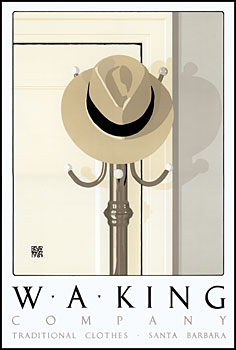
Click on image for detail
(#116) W. A. KING:
Edition of 2567 of which 300 copies are signed 1-300, 26 copies are signed A-Z as artist's proofs, and three sets are signed as progressives.
May 1, 1985 14 colors 16-1/8" x 24"
Client: W. A. King, 9 East Figueroa Street, Santa Barbara CA 93101. Telephone (805) 966-3333 A-Z: Artist's own use Progressives: One set to W. A. King
(Print's Regional Design Annual, 1986)
Though the basic purpose of clothing may be no more than protection from the elements, bodily adornment always transcends this simple goal. Fashion, as opposed to clothing, is a function of change in society and the possibility of change for individuals within society. Clothing and fashion tell people who you are and what part of society you belong to. In a strictly hierarchical society, there may be little room for individual fashion initiative. In a society undergoing rapid change, in which roles are constantly thrown into question, it is left to the individual to tell his fellows who he is and how he wants to be treated. Modern fashion is a product of three things, themselves inextricably inter-twined: mercantile capitalism, printing, and the Industrial Revolution. Men's fashions rapidly stabilized under these forces, and by the early 19th century reached a plateau from they have scarcely deviated.
Social power among men is a function of the possession and administration of wealth. Older, richer and more conservative members of the group are also the most powerful, and their clothing fashions are stable and conservative. Since men seek to associate themselves with the dominant power group, they dress to indicate that power. A military uniform is perhaps the ultimate expression, in which the individual disappears into the group, taking his entire identity from it and expressing no "self" whatever to the world. When you see a man in uniform, what you see is not a man but a uniform. A business suit, white shirt and necktie is equivalent, though less strict. Clothes maketh the man.
"Clothes make the man. Naked people have little or no influence in society." - Attributed to Mark Twain (1835-1910)